

![Top 15 Course Management System for 2025 [Free & Paid]](https://cdn.prod.website-files.com/62f0b227e38c6d799afcd8ba/6528e56eab8f44dc6a64faa1_15_Must_Have_CMS-min.avif)
![Top 15 Course Management System for 2025 [Free & Paid]](https://cdn.prod.website-files.com/62d6876535c5c7559909754c/67c036910fbf3721b5778e27_Attendance_Zoom-min%201.png)

Key Takeaways
- Importance of CMS:: CMS plays a pivotal role in streamlining course creation, content management, and learner engagement for organizations aiming to deliver effective and scalable training or educational programs.
- Top CMS Features: Must-have features include mobile-friendly design, integration with third-party tools, robust analytics, real-time collaboration, and secure data management.
- EdisonOS as the Top CMS: EdisonOS stands out for its mobile-first approach, advanced analytics, intuitive interface, and seamless integration options, making it versatile for education and corporate training.
As the eLearning market grows, choosing the right Course Management System (CMS) from among the best learning management systems is essential for organizations to deliver practical training and education. A CMS simplifies course creation, content management, and student engagement, helping businesses and educational institutions scale their programs efficiently.
After analyzing numerous CMS options, we’ve compiled a list of the top 15 systems for 2025, highlighting their key features and pricing to help you make an informed decision.
Best Course Management Software for 2025
Adopting a Course management system globally reflects the growing demand for accessible, personalized, and technology-driven education. The journey from basic online classes to AI-powered training courses has been transformative.
To curate the top 15 Course Management Systems for 2025, we reviewed each platform based on the following key metrics:
- Key Features: What the platform offers regarding course creation, content management, and student engagement.
- Pros and Cons: A balanced view of the system’s strengths and potential limitations.
- Integrations: Compatibility with third-party tools like Zoom, Google Drive, and payment gateways.
- Ratings: User ratings to assess overall satisfaction and performance.
- Scalability: The system’s ability to grow alongside the needs of educational institutions or businesses.
- Pricing: Pricing models, including free trials, business plans, and enterprise solutions.
Below is the table of the top 15 Course Management Systems for 2025, highlighting these key parameters for each tool:
1. EdisonOS
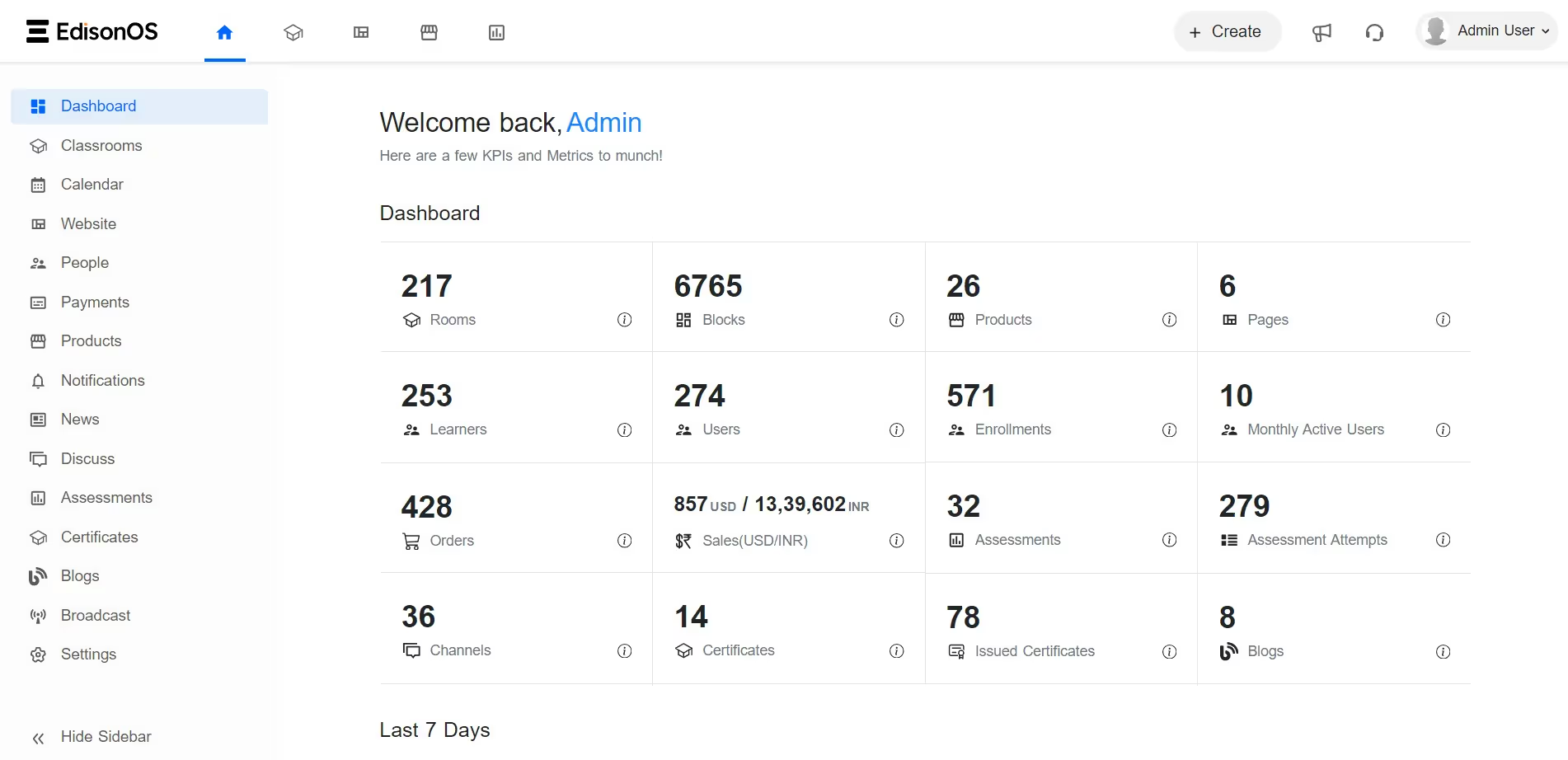
Overview
EdisonOS is an all-in-one Course Management System (CMS) designed to streamline online course creation and management for educators, entrepreneurs, and businesses. It is particularly suited for those needing a robust platform for employee onboarding, customer education, and continuous training. With a mobile-first design and extensive reporting features, EdisonOS makes managing and delivering courses simple, secure, and effective. Whether you’re a school, business, or individual educator, EdisonOS provides a comprehensive solution with robust course management features to build and scale your training programs.
Key Features to Look
- Mobile-centric design for flexible learning
- Comprehensive reporting and analytics
- Secure, encrypted environment for content and user data
- Built-in collaboration and communication tools
- Seamless content management for quick and easy course creation
Pros
- User-friendly interface for both students and educators
- Advanced reporting to monitor student performance
- Highly secure with strong encryption and privacy measures
- Mobile-first design allows learning anywhere, anytime
Cons
- Limited third-party app integrations
- The free plan comes with feature limitations
Integrations
- Zoom
- Google Drive
- PayPal
- Mailchimp
Ratings
- 4.8/5
Pricing
EdisonOS offers a free trial with pricing plans for small businesses and customizable enterprise solutions.
2. Moodle
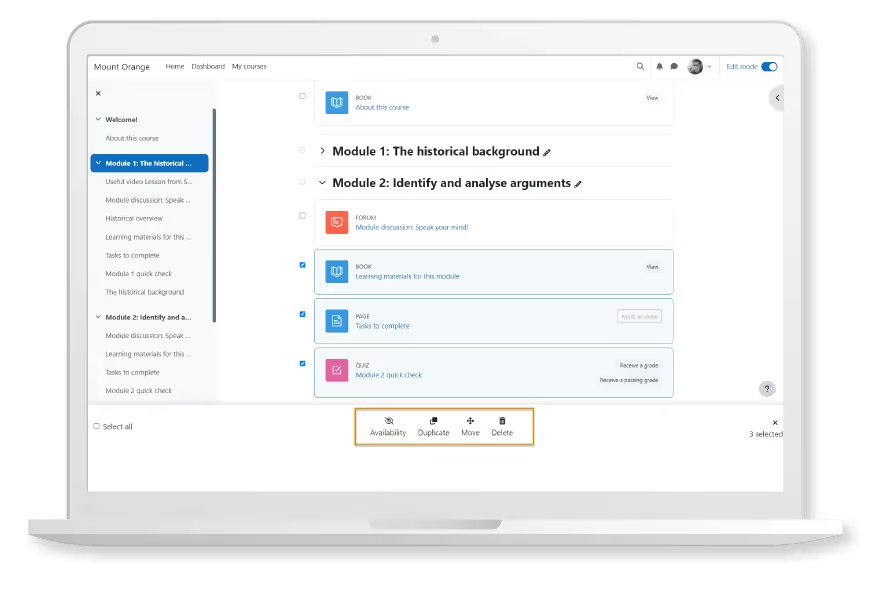
Overview
Moodle is an open-source Course Management System widely used by educational institutions worldwide. Known for its flexibility and customization, Moodle allows users to tailor the platform according to their unique needs. It’s ideal for schools, universities, and organizations that want complete control over their learning environment. The platform offers a range of features, from discussion forums to grading systems, making it one of the most popular choices for educators looking for comprehensive training course management software.
Key Features to Look
- Highly customizable and flexible
- Integrated tools for assignments, feedback, and assessments
- Open-source nature allows for extensive modifications
- Community-driven support and plugins
Pros
- Completely customizable platform for unique needs
- Vast community support and frequent updates
- No licensing cost due to its open-source nature
Cons
- Requires technical expertise for setup and maintenance
- Hosting and customization costs can add up
Integrations
- Google Workspace
- Microsoft Office 365
- PayPal
- H5P
Ratings
- 4.2/5
Pricing
Moodle is free, but additional costs may arise for hosting, customization, and technical support.
3. LearnWorlds
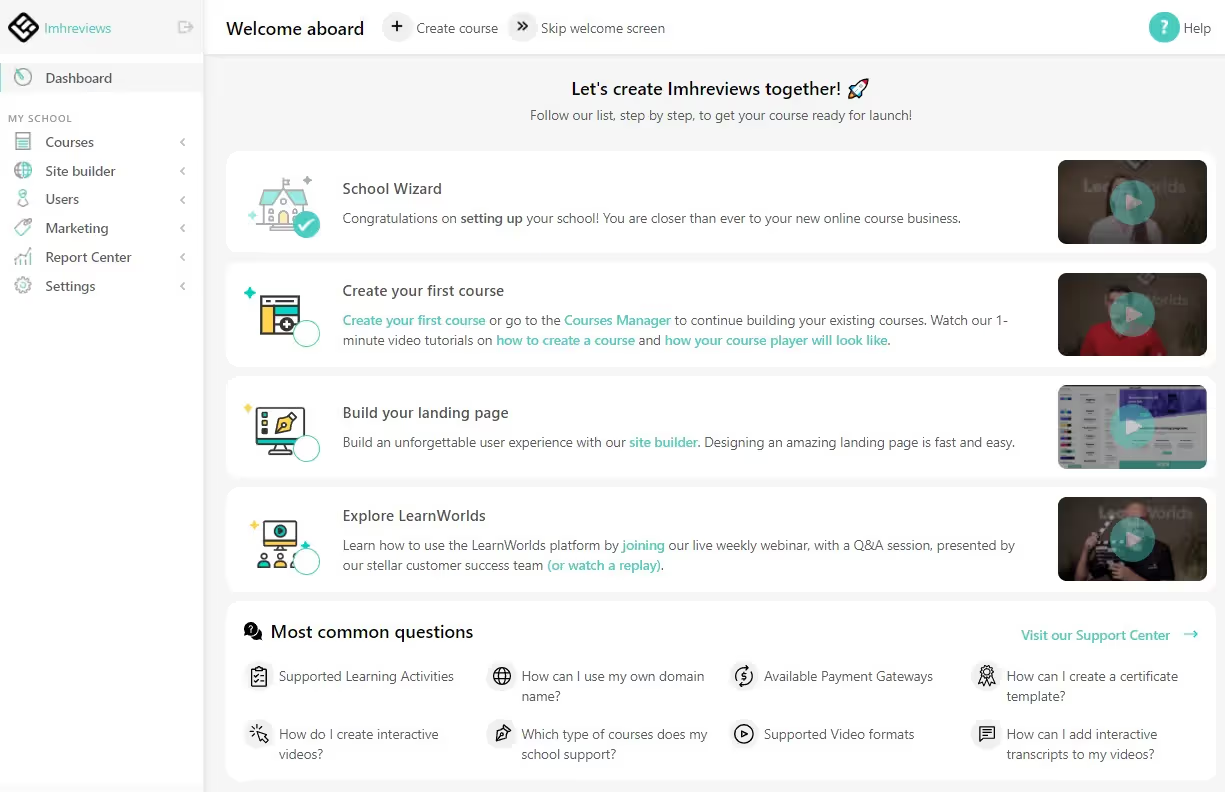
Overview
LearnWorlds is a powerful course creation and management platform tailored for businesses that sell courses. With tools for creating, marketing, and selling educational content, it's a great solution for individuals and organizations focused on online learning and course monetization. Its interactive video capabilities and website builder make it stand out from other LMS platforms.
Key Features to Look
- Customizable course creation
- Interactive video lessons and assessments
- Built-in website and app builder for a seamless learning experience
- Integrated marketing tools
Pros
- Engaging video content creation
- Comprehensive course-selling tools for entrepreneurs
- User-friendly website builder for branding and customization
Cons
- Limited customization in lower-priced plans
- Customer support can be slow during peak times
Integrations
- Zoom
- Zapier
- PayPal
- Stripe
Ratings
- 4.5/5
Pricing
Plans start from $29/month with additional tiers for more advanced features.
4. SkyPrep
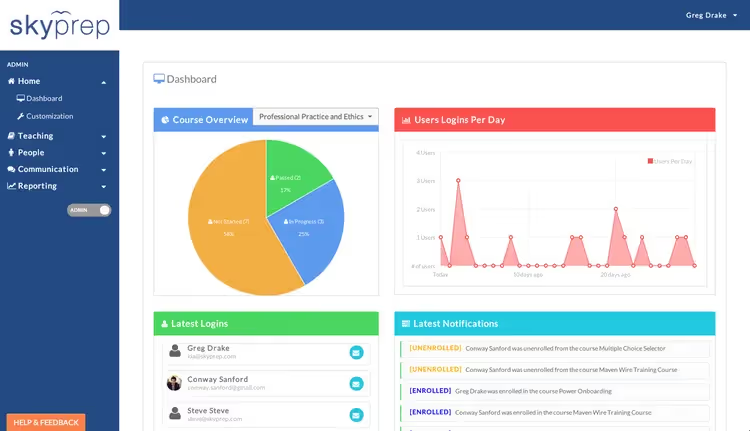
Overview
SkyPrep is a cloud-based CMS designed to make employee training more efficient and engaging. It offers a user-friendly interface with gamified learning paths, making it a great solution for corporate training and compliance training needs. SkyPrep provides real-time analytics and customizable reports, allowing businesses to track employee progress effectively.
Key Features to Look
- Customizable learning paths
- Gamified learning experience
- Real-time reporting and compliance tracking
- Easy file importing from cloud services
Pros
- Gamification increases learner engagement
- User-friendly interface for both admins and learners
- Real-time analytics for better training oversight
Cons
- Limited integrations compared to competitors
- Higher pricing for more advanced features
Integrations
- Google Drive
- Dropbox
- PayPal
- Zoom
Ratings
- 4.3/5
Pricing
A free 14-day trial is available; paid plans start from $249/month.
5. Absorb LMS
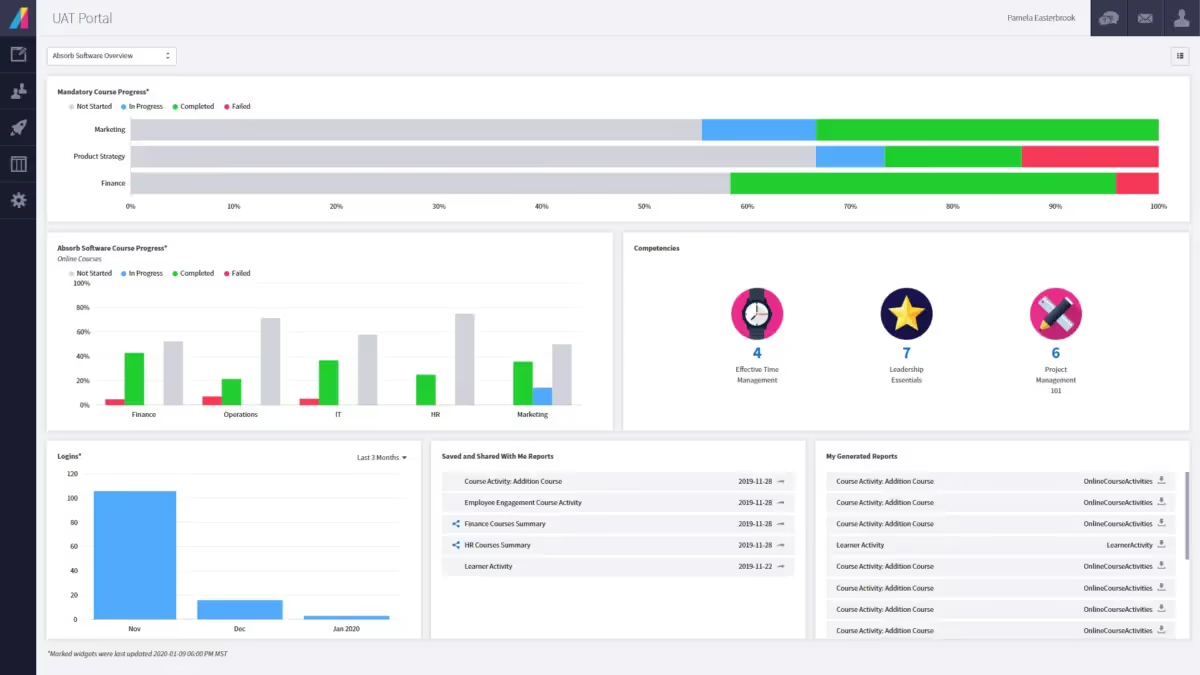
Overview
Absorb LMS is a feature-rich platform designed for corporate training. It focuses on offering a tailored learning experience through personalized learning paths and AI-driven insights. The platform is known for its user-friendly interface and robust analytics, making it ideal for large organizations needing a scalable solution. Similar to Adobe Learning Manager, Absorb LMS offers personalized learning paths and AI-driven insights, making it ideal for large organizations needing a scalable solution.
Key Features to Look
- Personalized learning paths with AI insights
- Discussion forums and collaborative tools
- Real-time reporting and analytics
- Secure learner portals
Pros
- Custom learning paths for tailored training
- AI-driven analytics for performance insights
- Highly scalable for large organizations
Cons
- Quote-based pricing can be high for small businesses
- The initial setup can be complex
Integrations
- Salesforce
- Zoom
- Microsoft Teams
- Shopify
Ratings
- 4.6/5
Pricing
Pricing is quote-based; contact Absorb LMS for details.
6. Canvas
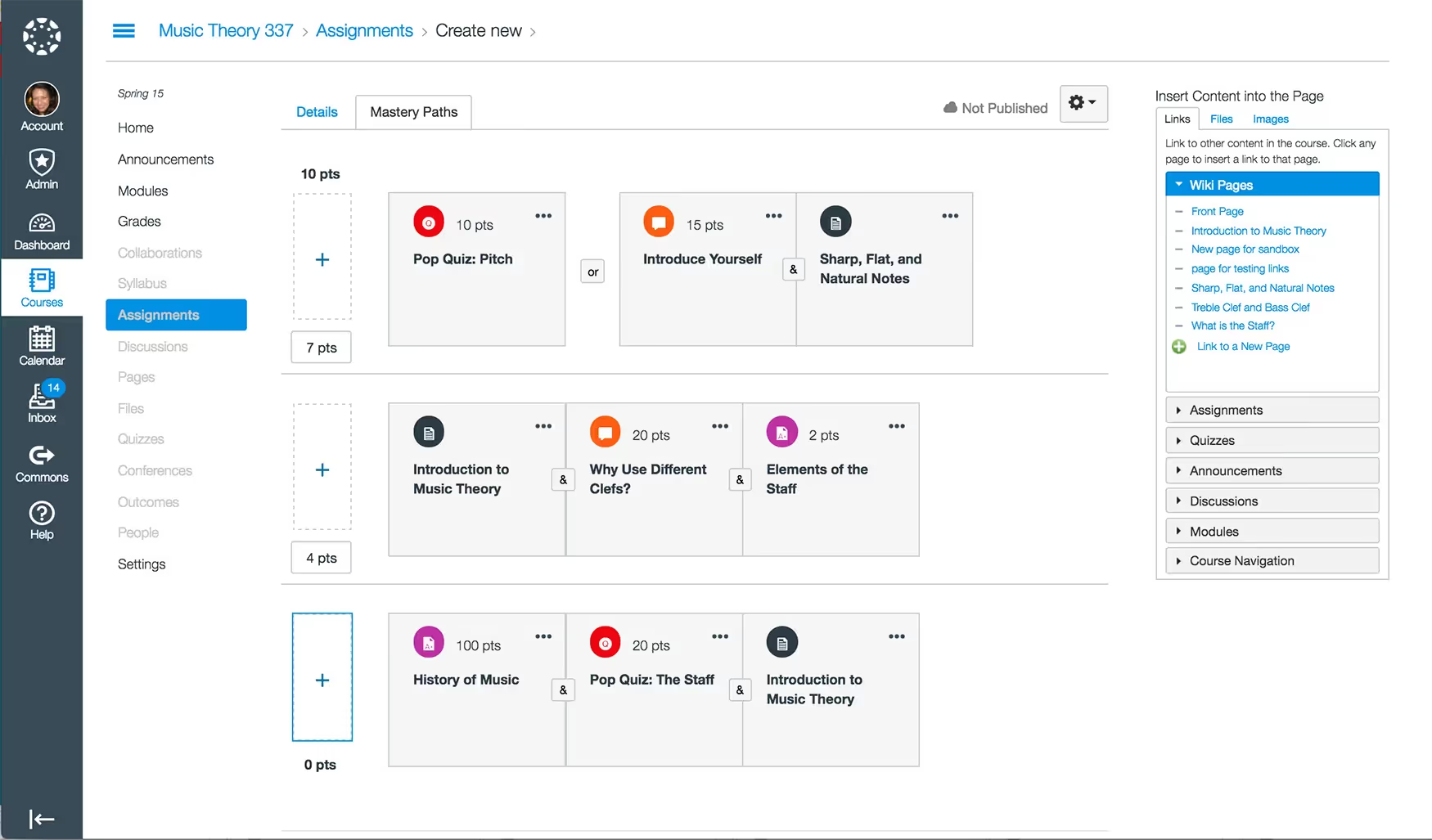
Overview
Canvas by Instructure is a leading LMS in the educational sector, particularly among schools and universities. It’s known for its comprehensive course management tools, including powerful dashboards, grading rubrics, and course scheduling. Canvas integrates seamlessly with various educational tools, providing an efficient system for delivering online learning.
Key Features to Look
- Robust course and assignment management tools
- Real-time analytics and feedback
- Outcome-based grading systems
- Integrates with many education standards
Pros
- Real-time analytics for student performance tracking
- Customizable learning modules for better engagement
- Highly scalable for educational institutions
Cons
- Pricing can be high for smaller institutions
- Advanced features may require a steep learning curve
Integrations
- Google Drive
- Microsoft OneDrive
- Turnitin
- Zoom
Ratings
- G2: 4.7/5
Pricing
Pricing is available on request; contact Canvas for a demo.
7. Learning Pool
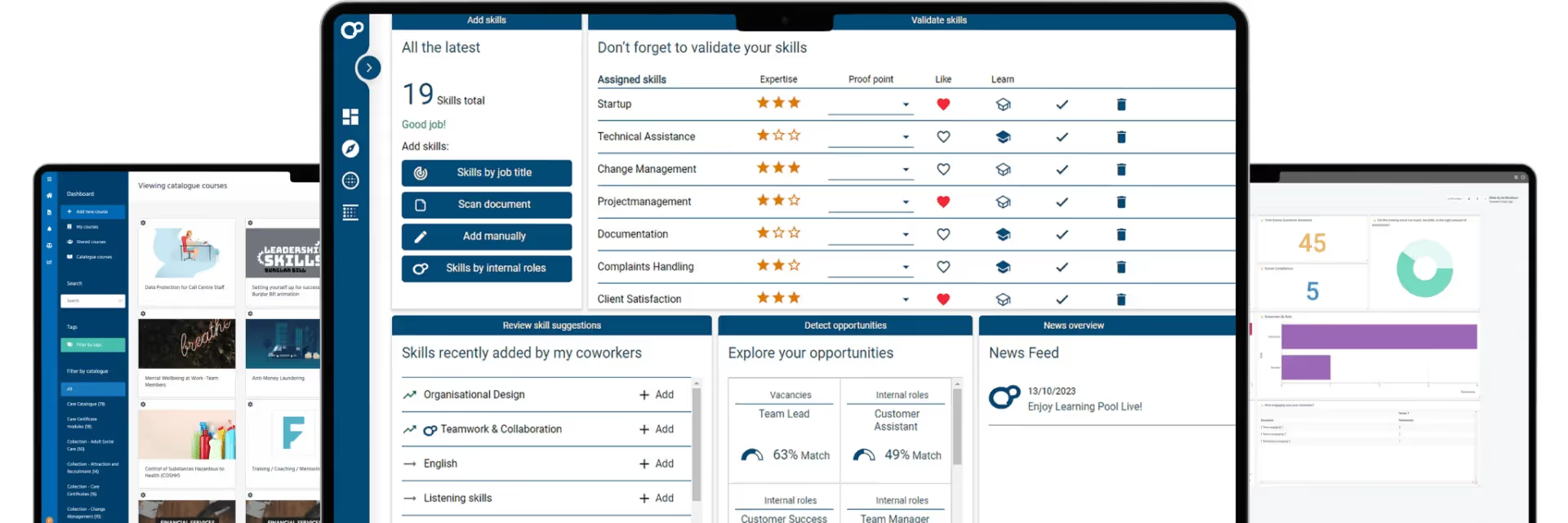
Overview
Learning Pool is a corporate learning platform designed to create meaningful learning experiences for employees. It offers a range of tools for content creation, delivery, and assessment, making it ideal for organizations that prioritize employee skill development. Learning Pool integrates adaptive content and AI-driven learning solutions to ensure a personalized experience for each learner.
Key Features to Look
- AI-powered learning platform
- Adaptive content for personalized learning
- Advanced reporting and analytics
- Engaging dashboards for user interaction
Pros
- Adaptive content ensures personalized learning experiences
- AI-powered platform for performance tracking
- Strong customer support for user onboarding and training
Cons
- Pricing is on the higher side for smaller businesses
- Limited flexibility in some learning paths
Integrations
- Microsoft Teams
- Slack
- LinkedIn Learning
- Zoom
Ratings
- 4.4/5
Pricing
Contact Learning Pool for detailed pricing options based on your needs.
8. eloomi
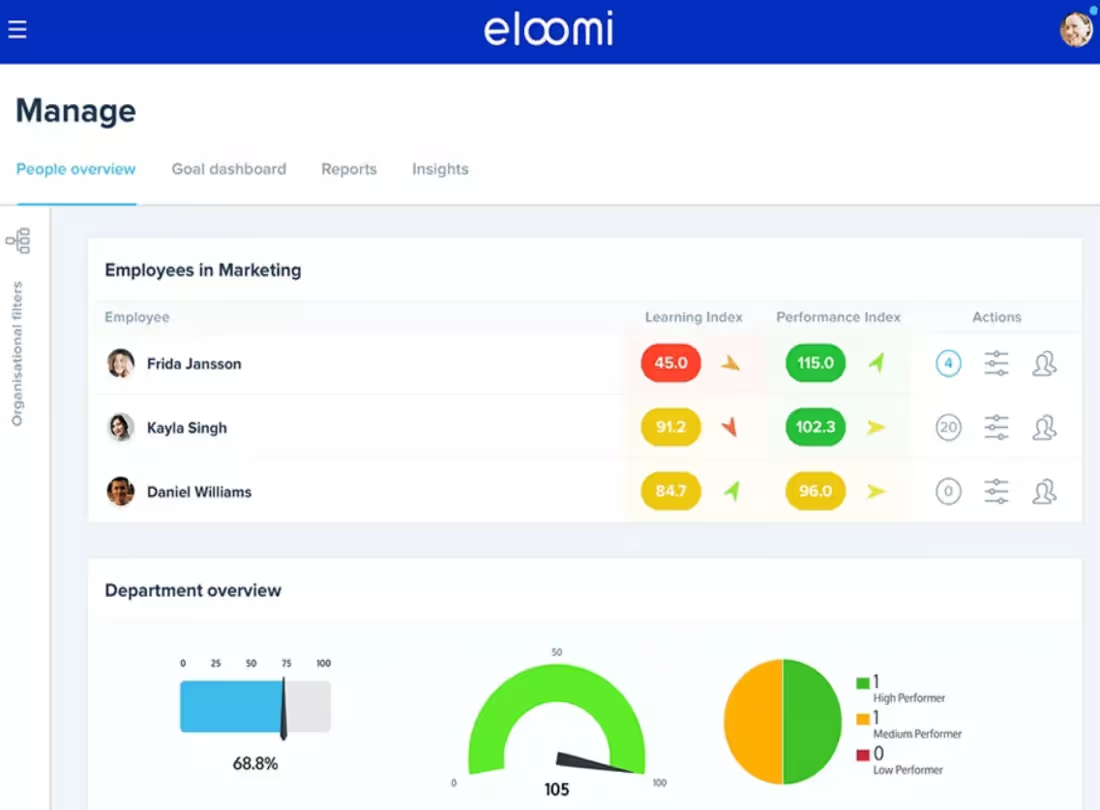
Overview
eloomi is a straightforward and flexible course management platform tailored to meet the needs of corporate training, onboarding, and compliance. It combines learning and performance management in one system, making it easier for businesses to track employee development and maintain compliance, including virtual instructor led training. With gamified features, eloomi encourages engagement and motivation in learning.
Key Features to Look
- Flexible course creation and management
- Performance and compliance tracking
- Gamification for better engagement
- Admin-friendly tools for easy setup
Pros
- Simple and flexible interface for admins and learners
- Gamified learning features increase engagement
- Compliance management built-in for regulated industries
Cons
- Limited customization for advanced users
- Support response can be slow during peak times
Integrations
- Microsoft Office 365
- Slack
- Dropbox
- Zoom
Ratings
- 4.6/5
Pricing
A free trial is available; paid plans start at $3/month.
9. iSpring Learn
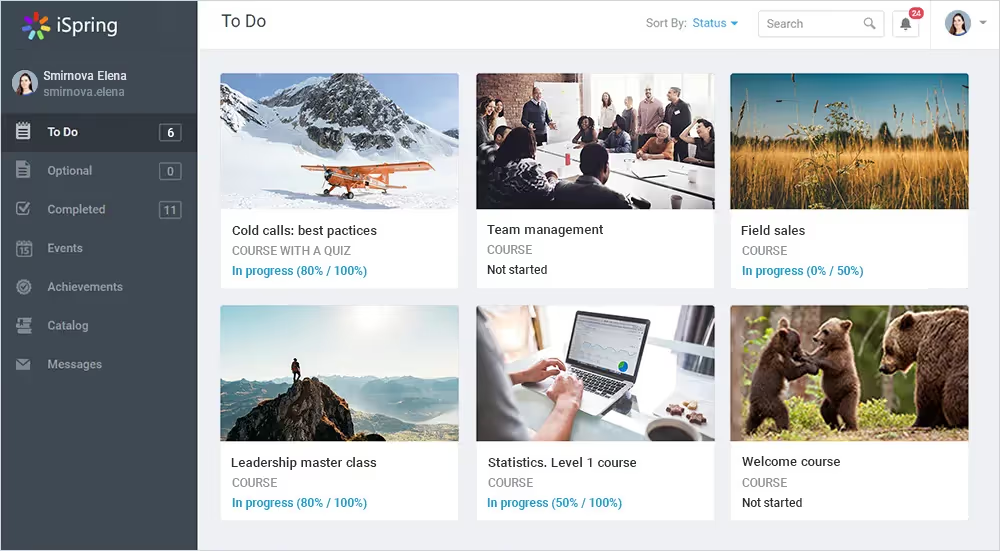
Overview
iSpring Learn is a rapid LMS platform known for its robust authoring tools and ease of use. It's designed for businesses that need to train employees quickly and efficiently. With offline access, real-time analytics, and mobile-friendly options, iSpring Learn ensures flexibility in corporate learning, making it a go-to for small to mid-sized companies.
Key Features to Look
- Powerful authoring tool for course creation
- Real-time analytics and reporting
- Offline access for learning anytime, anywhere
- Mobile-friendly platform
Pros
- Easy to use even for non-technical users
- Offline access allows uninterrupted learning
- Affordable pricing compared to competitors
Cons
- Limited advanced customization features
- It may require external integrations for certain functionalities
Integrations
- Zoom
- Salesforce
- Google Drive
- Slack
Ratings
- 4.8/5
Pricing
Offers a free trial; paid plans start from $2.87/month.
10. Blackboard Learn
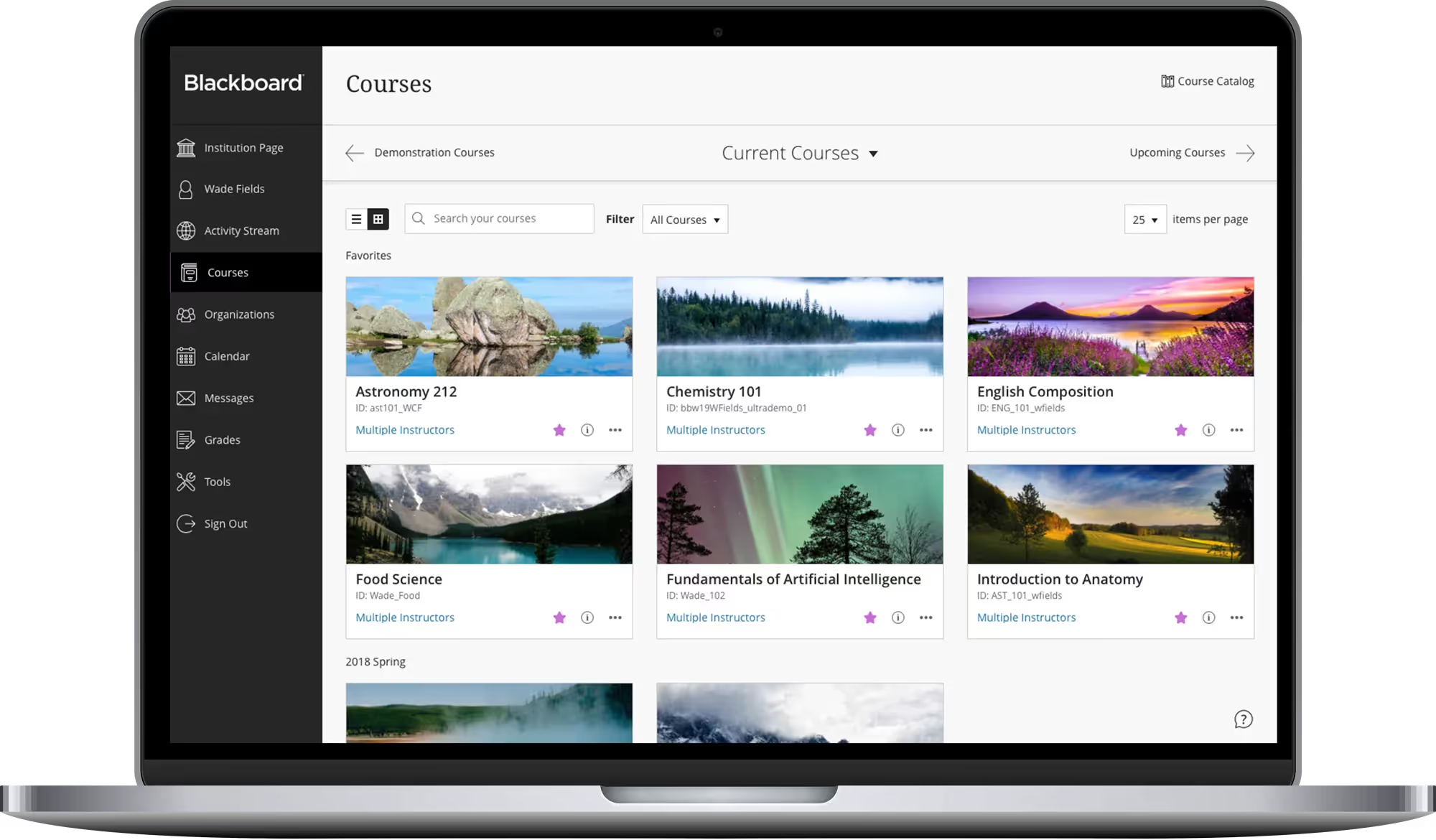
Overview
Blackboard Learn by Anthology is a leading LMS in the higher education sector, offering robust tools for both educators and learners. With advanced collaboration tools, grading systems, and real-time feedback, Blackboard Learn is a popular choice among educational institutions for enhancing student engagement and learning outcomes. Its flexibility and scalability make it a powerful tool for companies of any size, supporting both instructor led training and self-paced learning.
Key Features to Look
- Advanced grading and feedback tools
- Real-time collaboration features
- Integrates with various educational apps
- Customizable dashboards for teachers and students
Pros
- Powerful collaboration tools for enhanced learning
- Real-time feedback for students’ performance improvement
- Customizable interface for different user needs
Cons
- The higher learning curve for new users
- It can be expensive for smaller institutions
Integrations
- Turnitin
- Google Drive
- Microsoft Teams
- Zoom
Ratings
- 4.5/5
Pricing
Offers a free trial; pricing available upon request
11. Docebo
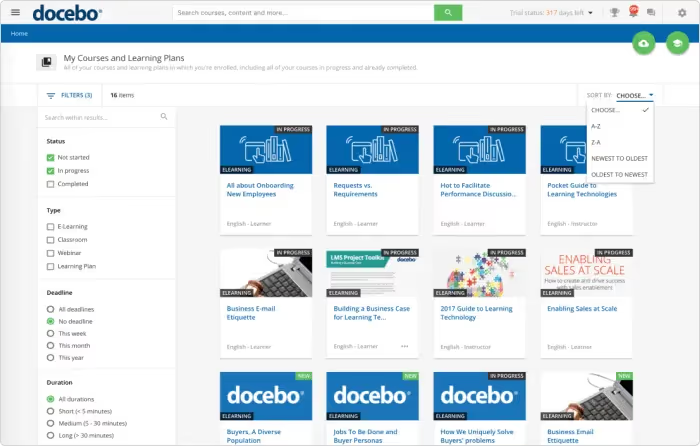
Overview
Docebo is an enterprise-focused training management system that leverages AI to provide tailored learning experiences. Its flexibility and scalability make it a powerful tool for companies of any size. With social learning features and real-time reporting, Docebo helps businesses enhance collaboration and track learning outcomes effectively.
Key Features to Look
- AI-driven learning paths
- Social learning tools for better collaboration
- Customizable learning portals
- Real-time analytics and reporting
Pros
- AI-powered learning enhances personalization
- Highly scalable for large organizations
- Social learning tools promote collaboration
Cons
- Custom pricing can be expensive for small businesses
- Complex setup for non-technical users
Integrations
- Salesforce
- Microsoft Teams
- Slack
- Zoom
Ratings
- 4.6/5
Pricing
Docebo provides custom pricing based on business needs; contact for more details.
12. Google Classroom
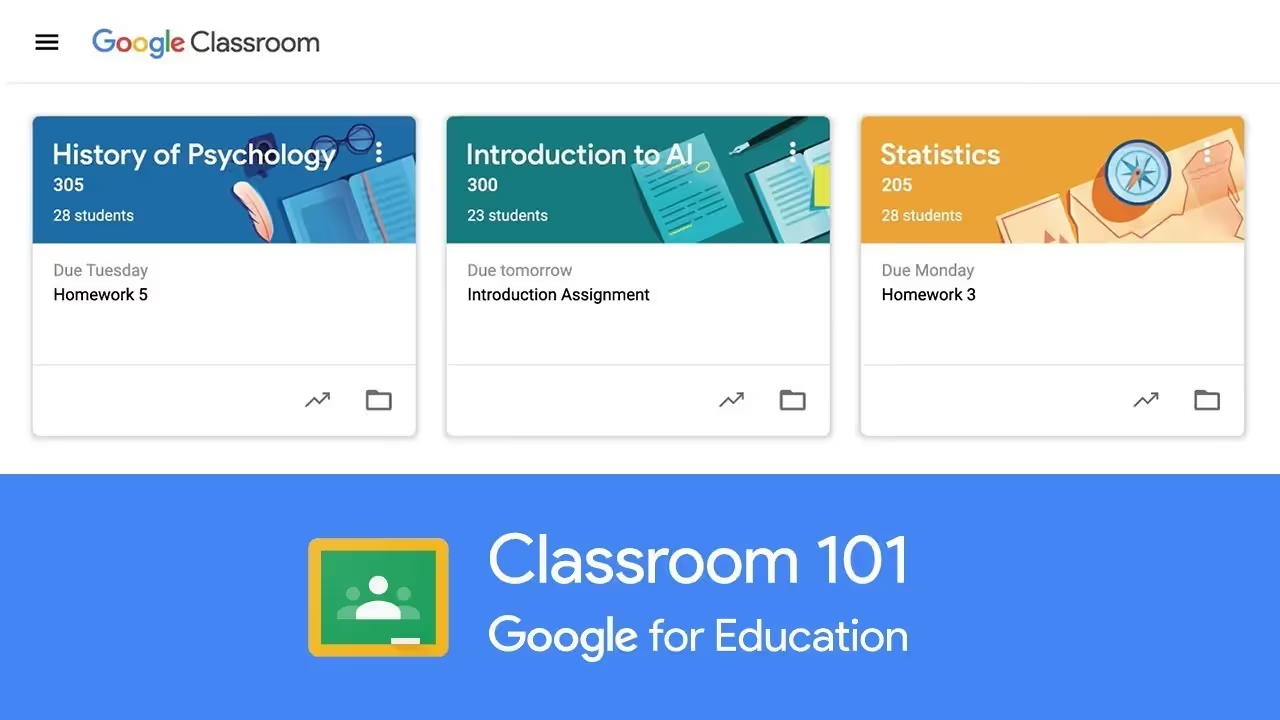
Overview
Google Classroom is a free, cloud-based learning management system designed for K–12 educators and students. It integrates seamlessly with Google’s suite of productivity tools and offers a simple platform for managing assignments, grades, and communication. With real-time collaboration features and cross-platform accessibility, Google Classroom is a top choice for schools looking for a low-cost, effective learning solution. While primarily designed for K–12 education, Google Classroom can also be utilized by training companies to manage assignments, grades, and communication.
Key Features to Look
- Free to use for schools and educators
- Seamless integration with Google tools
- Real-time collaboration for students and teachers
- Cross-platform accessibility
Pros
- Completely free for schools
- Seamless integration with Google products
- Simple and intuitive interface for users
Cons
- Limited advanced customization options
- Best suited for smaller educational settings
Integrations
- Google Meet
- Google Drive
- YouTube
- Zoom
Ratings
- 4.7/5
Pricing
Google Classroom is free for schools, with additional features available through G Suite for Education subscriptions.
13. Edmodo LMS
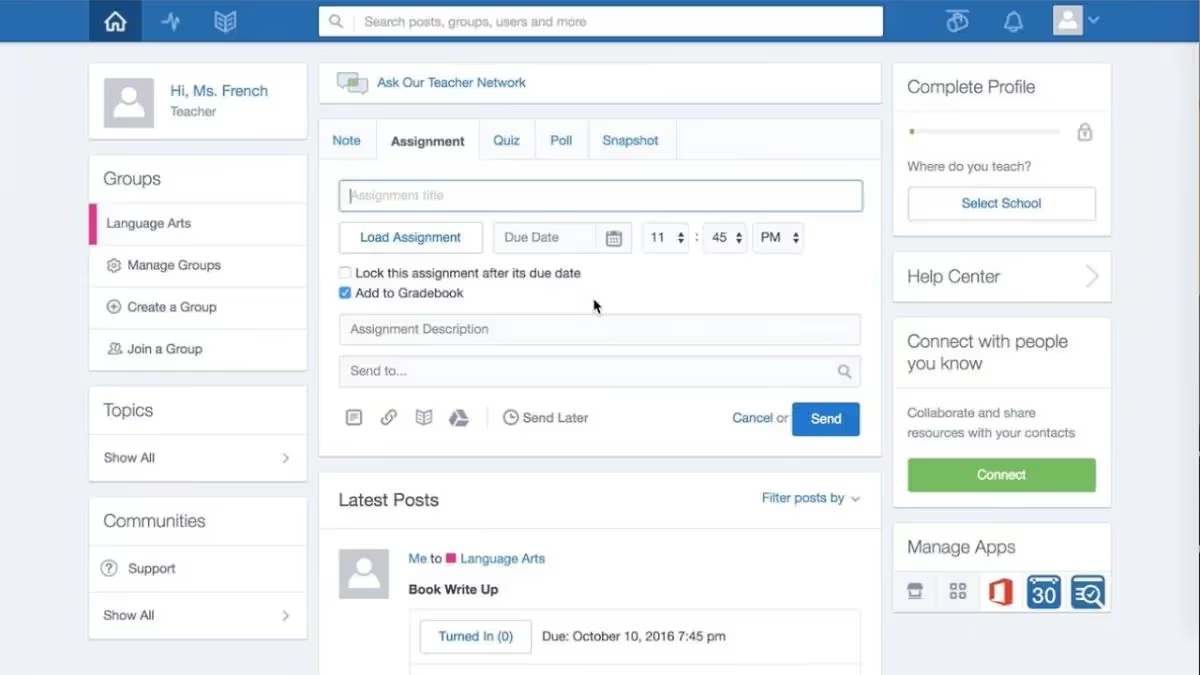
Overview
Edmodo LMS is a social learning platform that connects teachers, students, parents, and administrators in a single ecosystem. With features like assignment sharing, quizzes, communication tools, and real-time progress tracking, Edmodo is a popular choice for K–12 education and online courses. Its easy-to-use interface, coupled with unlimited storage and collaboration tools, makes it ideal for managing classroom activities in a digital environment.
Key Features to Look
- Integrated communication tools for students, teachers, and parents
- Unlimited storage for educational materials
- Quizzes, assignments, and grade tracking
- Social media-like interface for easy communication
Pros
- User-friendly social interface similar to social media
- Unlimited storage for educational content
- Real-time communication between students and teachers
Cons
- Limited features in the free version
- Best suited for K–12 rather than higher education or corporate training
Integrations
- Google Drive
- Microsoft OneDrive
- Zoom
- Quizlet
Ratings
- 4.3/5
Pricing
A free version is available, with premium options for additional features.
14. Brainshark
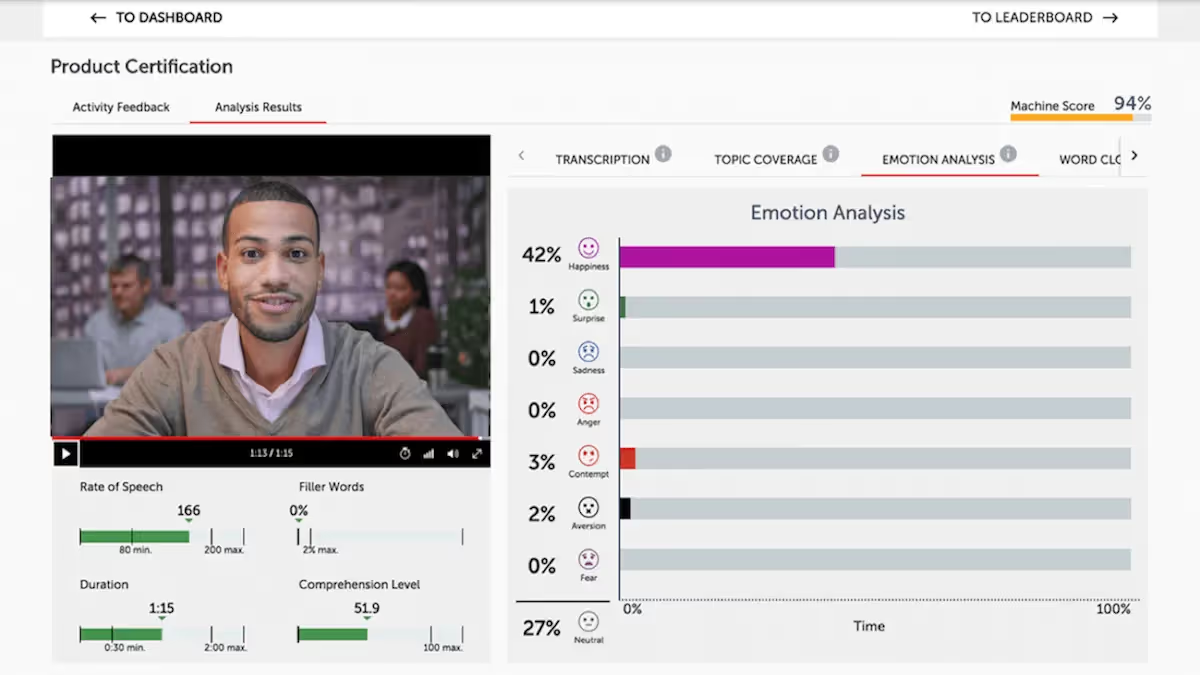
Overview
Brainshark is a leading CMS designed to help organizations train, onboard, and develop employees efficiently. Its powerful content creation tools allow users to develop interactive courses and track learner performance, making it an ideal course administration software for employee skill-building and engagement. Brainshark’s gamification features and in-depth reporting tools make it an ideal platform for employee skill-building and engagement.
Key Features to Look
- Interactive course creation tools
- Gamification to boost learner engagement
- Detailed reporting and performance analytics
- Certificate management for completed courses
Pros
- Easy-to-use course creation tools
- Gamification features improve learner engagement
- Comprehensive reporting for tracking employee performance
Cons
- Pricing can be expensive for smaller organizations
- Limited integration options for third-party apps
Integrations
- Salesforce
- Zoom
- Slack
- Microsoft Teams
Ratings
- 4.4/5
Pricing
Contact Brainshark for detailed pricing based on business needs.
15. Sana EasyGenerator
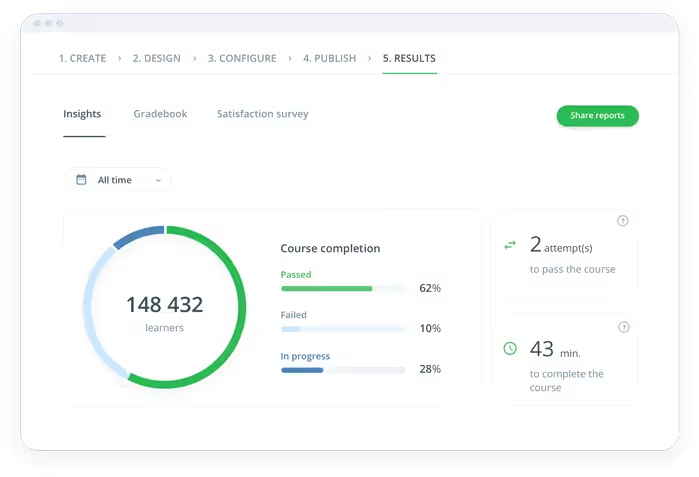
Overview
Sana EasyGenerator is a cloud-based course management system that simplifies content creation for businesses and educational institutions. It is designed to empower subject matter experts to create interactive e-learning content without requiring any technical expertise. With drag-and-drop functionality and AI-driven support, EasyGenerator is perfect for businesses that need a cost-effective yet powerful CMS for employee training and development.
Key Features to Look
- Drag-and-drop course creation
- AI-powered support for content creation
- Customizable templates for easy setup
- Cloud-based with global accessibility
Pros
- User-friendly interface with drag-and-drop functionality
- Cost-effective solution for businesses on a budget
- Cloud-based for easy access anywhere
Cons
- Limited advanced customization options
- Higher pricing for larger teams
Integrations
- Microsoft Office 365
- Slack
- Google Drive
- Zoom
Ratings
- 4.6/5
Pricing
Free version is available; paid plans start from $82/month.
According to a 2015 Capterra poll, 27% of respondents are dissatisfied with their existing course management system. However, they wind up spending 59% more than anticipated. Therefore, it's crucial to spend enough time weighing your options and choosing the one that offers the best return on investment.
What you desire and what you can afford are in an exciting tug-of-war in the realm of course management systems (CMS). However, there are certain aspects you need to consider before making an informed decision.
What is a Course Management System?
A Course Management System (CMS) is software that helps create, manage, and deliver courses online. It centralizes course content, assessments, and student management, making it easier for educators and organizations to organize, track, and facilitate learning. A CMS enhances the learning experience by streamlining content delivery, communication, and progress tracking. While a CMS focuses on course creation and management, a content management system (CMS) serves a broader role in facilitating content creation and distribution across various sectors.
Need for a Course Management System
Let’s skip the mundane long discussion and dive straight into the strong reasons why course management systems (CMS) have become the backbone of education and corporate training.
1. Statistical Evidence That Speaks Volumes
Did you know that CMS-using colleges claim higher student retention rates of 18%? Yes, keeping pupils interested in learning in a structured digital environment keeps them returning for more.
2. Streamlining the Chaos
Imagine having to handle all of the classes, assignments, and student records for a full school without a CMS. It's comparable to juggling torches in a hurricane. CMS systems bring order to this chaos, facilitating effective management and tracking of student development for institutions and educators.
3. The Power of Centralization
CMS platforms let you consolidate your course resources so that both teachers and students may readily access them. It's like having a digital library at your fingertips, and the advantages are obvious: better communication, more seamless collaboration, and more effective learning.
4. Time and Cost Effectiveness
Don't overlook the final result. Institutions that use CMS make significant time and resource savings. Teachers can concentrate on teaching, which is really important, when course materials, exams, and communications are streamlined. Institutions also save money because there is less administrative overhead.
Now, have a look at some serious consequences of neglecting a CMS
- Imagine a situation now without a CMS. There are courses dispersed across several platforms, information is buried in email threads, and there is no effective way to monitor student progress.
- It will only lead to uncertainty, annoyance, and ultimately a deterioration in educational quality.
- Without a CMS, the educational process devolves into a disorganized maze that promotes disinterest, high dropout rates, and a damaged reputation.
Hence, not only is it necessary, but investing in a strong CMS is also a decision. It entails giving teachers the resources they require in order to motivate, engage, and empower pupils. It involves designing an effective learning environment that encourages achievement both inside and outside of the classroom. Simply defined, a CMS is essential to contemporary education and not just a luxury.
Must-Have Features of a Course Management System
When choosing a Course Management System (CMS), it’s essential to ensure it comes equipped with key features that enable efficient course creation, management, and delivery. These must-have features ensure that the CMS will meet your organizational needs, improve the learning experience, and streamline administrative tasks. Here are the most critical features to look for:
1. Course Creation & Content Management
A robust CMS should offer easy-to-use tools for creating and organizing course content. This includes the ability to:
- Upload multimedia (videos, documents, and quizzes)
- Structure courses into modules or lessons
- Offer flexibility in content delivery (scheduled lessons or on-demand)
2. Student Enrollment & Tracking
Managing student enrollment and progress is key to an efficient CMS. Look for:
- Automated student enrollment processes
- Progress tracking with dashboards showing completion rates
- Student performance reports to monitor understanding and engagement
3. Assessment & Grading Tools
Effective assessment tools help measure student progress. A CMS should include:
- Customizable quizzes, tests, and assignments
- Grading systems that support rubrics and automatic grading
- Immediate feedback to keep learners engaged
4. Real-Time Analytics & Reporting
Advanced reporting capabilities help organizations assess the effectiveness of their courses. Must-have reporting features include:
- Real-time insights into student activity and engagement
- Detailed analytics on assessments and course performance
- Customizable reports to meet specific organizational needs
5. Mobile-Friendly Design
In today's digital age, learners expect to access content from any device. A mobile-first design ensures:
- Seamless access to courses on smartphones and tablets
- Responsive layouts that adapt to different screen sizes
- Mobile-optimized content for on-the-go learning
6. Communication & Collaboration Tools
A good CMS facilitates interaction between instructors and learners. Look for:
- Built-in discussion forums, live chats, or messaging systems
- Video conferencing integration (e.g., Zoom or Google Meet)
- Collaboration tools for group work and peer reviews
7. Security & Privacy
With sensitive learner information at stake, a secure CMS is non-negotiable. Key security features should include:
- Data encryption and secure login protocols
- Compliance with GDPR and other privacy regulations
- User permissions to control access to course content
8. Integrations with Third-Party Tools
Seamless integration with other platforms enhances the functionality of a CMS. Must-have integrations include:
- Payment gateways for selling courses (e.g., PayPal, Stripe)
- Learning tools like Google Workspace or Microsoft Office
- Marketing tools like Mailchimp or CRM platforms
9. Scalability & Customization
As your training needs grow, the CMS should scale with you. Features to look for include:
- Scalability to accommodate more students and content without performance issues
- Customization options to match your branding and course needs
- Plugins or APIs for adding new functionality as required
10. Support & Training Resources
A reliable CMS should come with strong customer support and training materials, including:
- Comprehensive knowledge bases or tutorials
- 24/7 customer support for troubleshooting
- Community forums for peer assistance and knowledge-sharing
These must-have features will help ensure that your CMS can handle all aspects of course management, providing a smooth experience for both instructors and learners.
Things to consider when choosing the best course management system in 2025
1. Cost-effective Options
Certain CMS platforms' alluring price tags have a catch: they could scrimp on features. It's comparable to purchasing a flashy car without an engine. Yes, it looks wonderful, but will it lead you on your e-learning trip in the direction you want to go?
2. Rich in Features Giants
On the other hand, there are CMS behemoths with a wide selection of functionality. Owning such a sophisticated starship with all the bells and whistles is like. But be ready to reach deep into your wallet. These cost more money.
3. Maintaining Balance
Finding the ideal learning management system requires balancing functionality and price. It's like getting a strong engine in a stylish, reasonably-priced car. You want a course management software that provides the required tools without being too expensive.
4. Goldilocks Territory
A rich feature set, scalability, user-friendliness, and cost are all qualities of the "just right" CMS. In e-learning solutions, it's like finding a precious jewel.
Above all else, you should use each of these CMSs personally to comprehend and contrast them thoroughly. However, based on the CMS's detailed overview, EdisonOS has all the necessary features and can give you maximum ROI.
Why is EdisonOS the Best Course Management Software in 2025?
EdisonOS stands out as the top course management software in 2025 due to its comprehensive features, mobile-first approach, and versatility across various industries. Whether you're an educational institution, a corporate training provider, or an entrepreneur building an online academy, EdisonOS provides the tools and flexibility to meet your needs.
Key reasons why EdisonOS is the best CMS in 2025:
- Mobile-first design: Ensures learners can access courses anytime, anywhere, making education more flexible and accessible.
- Advanced analytics: Offers real-time insights into student progress, enabling educators to fine-tune their teaching methods for better outcomes.
- Ease of use: With an intuitive interface, both educators and students can navigate the platform effortlessly, ensuring a seamless learning experience.
- Comprehensive integrations: Easily integrates with essential tools like Zoom, Google Drive, and PayPal, streamlining operations and communication.
- Security and privacy: EdisonOS offers robust data encryption and privacy safeguards, making it a secure option for any organization.
EdisonOS is the ideal choice for anyone looking to streamline course creation, manage content effectively, and ensure high-quality learning outcomes in 2025.
FAQs
1. What is course management?
Course management refers to the process of organizing, delivering, and tracking educational or training programs. It includes creating course materials, scheduling lessons, managing student progress, and facilitating communication between learners and educators to ensure efficient learning outcomes.
2. What is a Course Management System?
A Course Management System (CMS) is a platform that enables educators and organizations to create, manage, and deliver courses online. It centralizes course materials, assessments, and learner data, streamlining the learning process and enhancing communication between instructors and students.
3. Purpose of a Course Management Solution
The primary purpose of a Course Management Solution is to simplify the process of delivering education or training by centralizing course content, managing learners, tracking performance, and automating administrative tasks. It enables organizations to provide effective, organized, and accessible learning experiences.
4. Key Features of Course Management Software
Key features of course management software include:
- Course creation and content management
- Student tracking and progress reporting
- Collaboration tools for communication
- Assessment and grading systems
- Integration with third-party tools like payment gateways or video conferencing apps
5. Course Management System vs. Learning Management System
While both Course Management Systems (CMS) and Learning Management Systems (LMS) manage and deliver educational content, a CMS focuses more on the organization and administration of course materials. In contrast, an LMS provides a broader scope that includes tracking learning outcomes, managing certifications, and offering personalized learning paths.

Recommended Reads
Recommended Reads












.png)
.webp)
